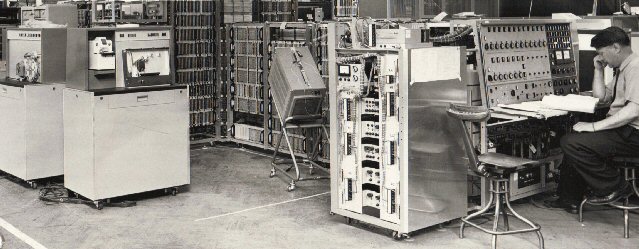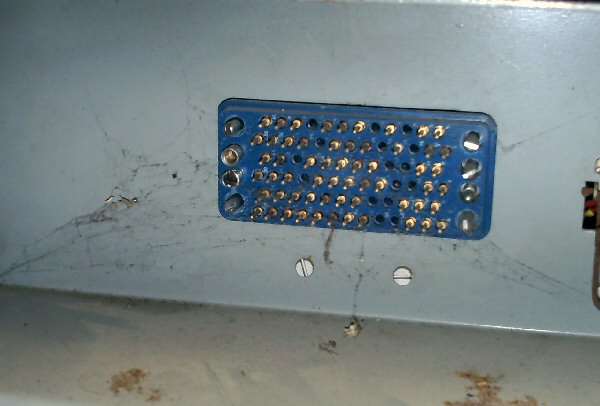








Story

(Hardware) Designer
Final Spec
Concepts
Old Comp

Software

People

Media

Support

Future

Links-

The ICT 1301 Resurrection Project.
Concepts that survived the design.
The 1302 and The Executive Control Program
** News of the 1302 ( and now 'Pictures' ) **
We now have news of the 1302, as a result of the Putney Party and help from
Hamish Carmichael, Ex Hon Secretary of the Computer Conservation Group of the British
Computer Society
Documents stored in the archive at Blyth house have thrown light on this almost
forgotten machine.
Produced in limited quantity ( about 4 only as far as we can see ).
These machine's were the first ( within ICL ) to
utilise the concept of
automatic multi programing, or time sharing. A somewhat radical redesign of the
1301
system architecture, but still founded on the same logic elements. The
system was the first
to use such names as "Executive", as a title for its control program,
( commonly thought to have only originated from the ICL 1900
series ) and program switching by system interupt, thereby sharing the
CPU time between
tasks, such as waiting for a data transfer to terminate.
The documents
also
explain how the machine addressed the increased store above the 2,000 word
limit. 16,000 words
bieng the lower limit on a 1302.
Executive was a piece of software code about 3,000 1301 words and lived on the
drum where it was envoked by initial orders.
The main concept change was the utilisation of the typewriter interface which was
always part of the design of any 1300. This drove a console typewriter ( not a teletype )
which responded interactivly to the operator who issued instructions such as,
LOAD P3 ( load program into slot 3, a hardware paged part of store ),
RUN P3 ( run the program ) or
IN xxx P3 ( input data (xxx) to program 3 ).
** 1302 Pictures **
More news recently ' again from Hamish ' so on this page, is a Photograph of a 1302,
with no covers fitted, and two 1900 ' Standard Interface ' devices to the Left.
Where this photo was taken we do not know, but it is dated 12 May 1964, our best guess is
that it was in the GEC Telephones factory at Coventry. As to who the gentleman seated
at the console and deep in thought is? We do not know, but his pose is common for many
who worked on this and indeed any makers equipment from this period !

We are assuming this was a minimum 16k word ( 96 kilo byte ) 1302 at the Factory !
The migration of the Executive to the 1900 Range
The concept of the executive program did not pass-away with the 1302, when the
company took the Ferranti Packard design which was the next generation computer
and launched the 1900 series. Here was a ready made control program for the
system, already debugged and it only needed adaption to the new hardware.
So the early 1900's used the 1302 Executive to controll more than one running
sub program at a time, however notice this was time sharing not genuine Multi
programing. But then your average Windows PC only has one CPU and can only
run ONE program at a time, which is by definition still time sharing.
I personally saw the executive concept remain through the 1900's, the 2903,
the 2950's and the 2960's and it was not until the 3900's systems arrived that
the executive took a lower position in the systems as things like George and
other Virtual Machine environments took over.
Hands up if you know what I mean by
VMEK ? or VMEB ?
The 1900 series Standard Interface
So what was standard about the interface, used for peripheral control on the 1302
and the 1900's? well not a lot !. But it did create a standard for the exchange of data
to and from the devices allowing the introduction of simpler autonomus controllers
for things like large arrays of disk drives.
Here is a picture of the 1900 interface socket on Flossie a 1301 computer

Before anyone asks 'Yes' that is a cobweb you can see !
Eventually this concept was extended and moving beyond the 1900 range even autonomus
control of Core stores, on later systems like the 2900 range where the SAC ' Store
access controller ' and the SMAC ' Store memory access controller ' became pivotal
components on Virtual Machine Envionments ( VME )
We now have news of the 1302, as a result of the Putney Party and help from
Hamish Carmichael, Ex Hon Secretary of the Computer Conservation Group of the British
Computer Society
Documents stored in the archive at Blyth house have thrown light on this almost
forgotten machine.
Produced in limited quantity ( about 4 only as far as we can see ).
These machine's were the first ( within ICL ) to
utilise the concept of
automatic multi programing, or time sharing. A somewhat radical redesign of the
1301
system architecture, but still founded on the same logic elements. The
system was the first
to use such names as "Executive", as a title for its control program,
( commonly thought to have only originated from the ICL 1900
series ) and program switching by system interupt, thereby sharing the
CPU time between
tasks, such as waiting for a data transfer to terminate.
The documents
also
explain how the machine addressed the increased store above the 2,000 word
limit. 16,000 words
bieng the lower limit on a 1302.
Executive was a piece of software code about 3,000 1301 words and lived on the drum where it was envoked by initial orders.
The main concept change was the utilisation of the typewriter interface which was always part of the design of any 1300. This drove a console typewriter ( not a teletype ) which responded interactivly to the operator who issued instructions such as, LOAD P3 ( load program into slot 3, a hardware paged part of store ), RUN P3 ( run the program ) or IN xxx P3 ( input data (xxx) to program 3 ).
** 1302 Pictures **
More news recently ' again from Hamish ' so on this page, is a Photograph of a 1302,
with no covers fitted, and two 1900 ' Standard Interface ' devices to the Left.
Where this photo was taken we do not know, but it is dated 12 May 1964, our best guess is
that it was in the GEC Telephones factory at Coventry. As to who the gentleman seated
at the console and deep in thought is? We do not know, but his pose is common for many
who worked on this and indeed any makers equipment from this period !

We are assuming this was a minimum 16k word ( 96 kilo byte ) 1302 at the Factory !
The migration of the Executive to the 1900 Range
The concept of the executive program did not pass-away with the 1302, when the
company took the Ferranti Packard design which was the next generation computer
and launched the 1900 series. Here was a ready made control program for the
system, already debugged and it only needed adaption to the new hardware.
So the early 1900's used the 1302 Executive to controll more than one running
sub program at a time, however notice this was time sharing not genuine Multi
programing. But then your average Windows PC only has one CPU and can only
run ONE program at a time, which is by definition still time sharing.
I personally saw the executive concept remain through the 1900's, the 2903,
the 2950's and the 2960's and it was not until the 3900's systems arrived that
the executive took a lower position in the systems as things like George and
other Virtual Machine environments took over.
Hands up if you know what I mean by
VMEK ? or VMEB ?
The 1900 series Standard Interface
So what was standard about the interface, used for peripheral control on the 1302
and the 1900's? well not a lot !. But it did create a standard for the exchange of data
to and from the devices allowing the introduction of simpler autonomus controllers
for things like large arrays of disk drives.
Here is a picture of the 1900 interface socket on Flossie a 1301 computer

Before anyone asks 'Yes' that is a cobweb you can see !
Eventually this concept was extended and moving beyond the 1900 range even autonomus
control of Core stores, on later systems like the 2900 range where the SAC ' Store
access controller ' and the SMAC ' Store memory access controller ' became pivotal
components on Virtual Machine Envionments ( VME )
More news recently ' again from Hamish ' so on this page, is a Photograph of a 1302,
with no covers fitted, and two 1900 ' Standard Interface ' devices to the Left.
Where this photo was taken we do not know, but it is dated 12 May 1964, our best guess is
that it was in the GEC Telephones factory at Coventry. As to who the gentleman seated
at the console and deep in thought is? We do not know, but his pose is common for many
who worked on this and indeed any makers equipment from this period !

We are assuming this was a minimum 16k word ( 96 kilo byte ) 1302 at the Factory !
The migration of the Executive to the 1900 Range
The concept of the executive program did not pass-away with the 1302, when the
company took the Ferranti Packard design which was the next generation computer
and launched the 1900 series. Here was a ready made control program for the
system, already debugged and it only needed adaption to the new hardware.
So the early 1900's used the 1302 Executive to controll more than one running sub program at a time, however notice this was time sharing not genuine Multi programing. But then your average Windows PC only has one CPU and can only run ONE program at a time, which is by definition still time sharing.
I personally saw the executive concept remain through the 1900's, the 2903, the 2950's and the 2960's and it was not until the 3900's systems arrived that the executive took a lower position in the systems as things like George and other Virtual Machine environments took over.
Hands up if you know what I mean by
VMEK ? or VMEB ?
The 1900 series Standard Interface
So what was standard about the interface, used for peripheral control on the 1302
and the 1900's? well not a lot !. But it did create a standard for the exchange of data
to and from the devices allowing the introduction of simpler autonomus controllers
for things like large arrays of disk drives.Here is a picture of the 1900 interface socket on Flossie a 1301 computer

Before anyone asks 'Yes' that is a cobweb you can see !
Eventually this concept was extended and moving beyond the 1900 range even autonomus control of Core stores, on later systems like the 2900 range where the SAC ' Store access controller ' and the SMAC ' Store memory access controller ' became pivotal components on Virtual Machine Envionments ( VME )
